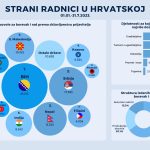Parties with candidate lists with less than 40 percent of women (or men) will have to pay fines between 20,000 and 40,000 kuna.
Although the Law on Gender Equality stipulates that election lists at all levels must have at least 40 percent of their candidates of each gender, the forthcoming local elections will be the first where parties and independent lists which do not meet the so-called “female quota” will have to pay fines, reports Večernji List on May 10, 2017.
Candidate lists for town councils and county assemblies without enough female candidates will pay 40,000 kuna, while lists for municipal councils will pay 20,000 kuna.
Parties are obviously aware of this. The State Election Commission’s preliminary figures show that 41 percent of candidates on lists are women, which is a big improvement compared to 2013, when only 28 percent of the candidates were women. This time, even the largest parties, HDZ and SDP, have taken the female quota into account, aware that failure to comply with legal provisions could cost them, not only politically, but also financially. Their presidencies asked the county and local party organisations to make sure there are at least 40 percent of both genders on the lists.
“The Presidency has given clear instructions. Even though we have not yet gone through all the lists, I believe that all organisations have strictly respected the rules. If it turns out that someone has not met the gender equality rules, such party organisations will be held accountable,” said SDP Secretary General, Zvane Brumnić.
Similarly, the President of the HDZ Women’s Forum, Nada Murganić, said that the total representation of women on all lists had been ensured, but she could not guarantee that each list met the 40 percent quota. “If there are party branches who have disregarded the instructions on gender representation, they will bear the responsibility and pay the penalties themselves,” Murganić said.
Zagreb Mayor Milan Bandić fulfilled not only the female quota for the City Assembly, but he also named two women as his candidates for deputy mayor. As for candidate lists for the City Assembly, Bandić has nominated 27 women and 24 men. Although he has given priority to women, Bandić obviously paid attention to fulfilling the “male quota” as well, which means that candidate lists must include at least 40 percent of male candidates as well.
However, it should be noted that the mere number of women on the candidate lists does not automatically mean that there will be more of them in town and municipal councils, since women are usually placed at the bottom of the lists. The parties explain this by saying that women are not ready to engage in politics, especially at the local level.
Still, the female quota should at least somewhat change the gender ratio in Croatian politics, especially after the recent decline in the proportion of women in the Parliament. With 28 women among 151 MPs, which is the share of just 12%, Croatia is ranked 97th among more than 190 countries, sharing its position with Saudi Arabia.







